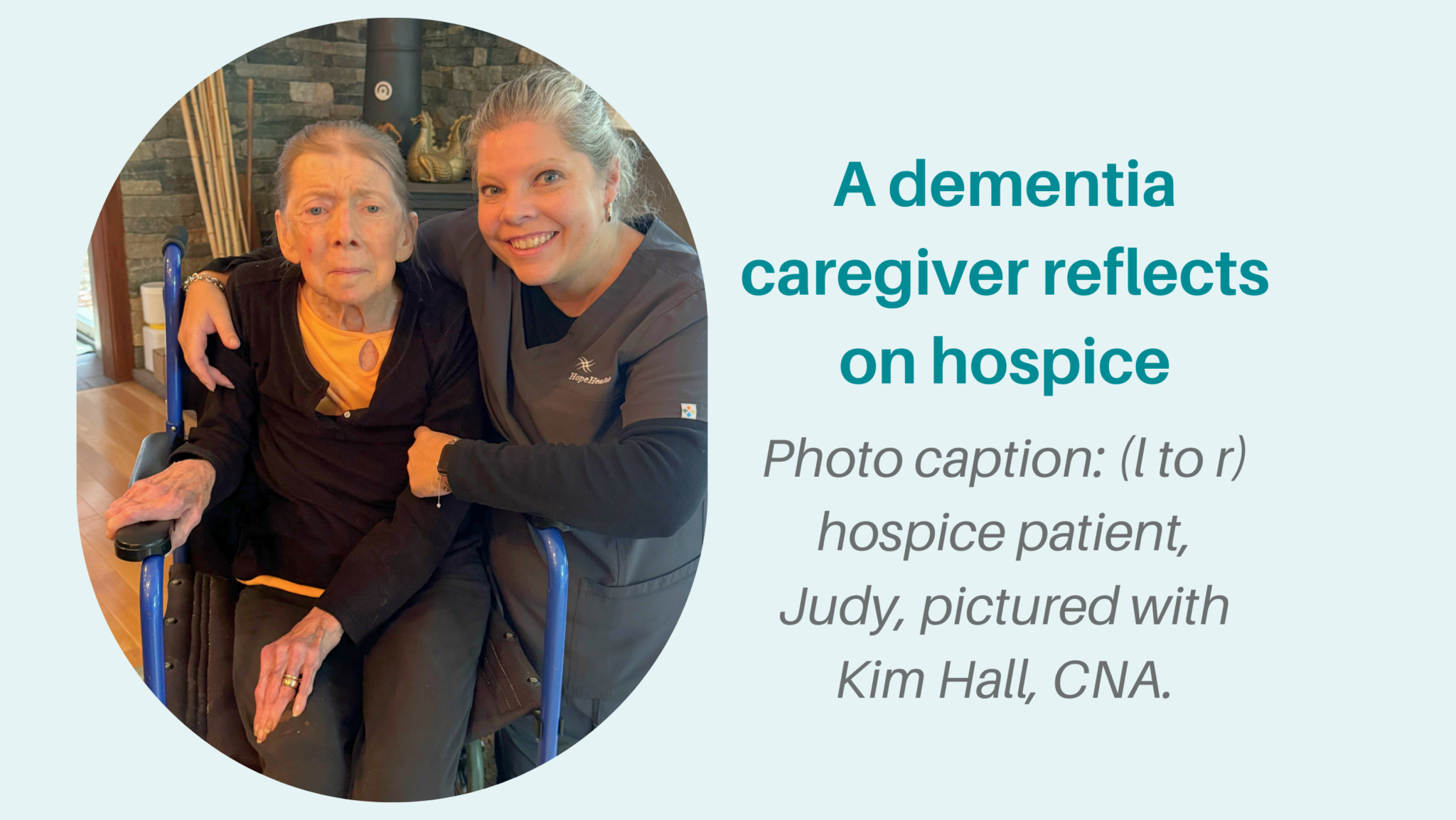That birthday dinner began much like many others. Frank sat across from his wife, Judy — the woman he’d celebrated every birthday with since he was 16 years old. They’d been a couple for nearly 60 years: had traveled the world together, built a business together, raised two kids together.
Then Judy smiled at him and politely asked, as if they were on a first date, “Do you have any children?”
And he knew.
“Both her mother and grandfather were in a similar situation with dementia,” Frank says. “I had kind of expected it, in a way.”
> Connect with HopeHealth Circle of Love dementia care
“The best thing that we have done”
After the official diagnosis, Judy’s doctor suggested hospice care. At first, Frank resisted. He felt the profound weight of guiding Judy’s medical care, and worried hospice might take away their control over certain decisions. He also worried what it meant for their remaining time together. They were both still in their 70s.
“It was intimidating. As soon as I heard the word hospice, I thought it meant very close to end of life,” Frank says. “Back then, I had a totally different perception of what hospice was.”
After more research and conversations, though, he learned that hospice wouldn’t take away their control over Judy’s care — if anything, it would give them more of it. For example, Judy would receive specialized medical services right at home, and she and Frank would both have access to emotional and spiritual support. As for their time together, hospice has actually been shown to help many patients live longer.
Finally, Frank learned that if they ever changed their mind, they could opt out at any time. “That took away the real scary, out-of-control part of it for me,” he says.
He and Judy said yes to hospice.
“I have to say that it is the best thing that we have done,” he says.
> Checklist: What to look for in a hospice provider
“Hospice is not what I thought it was”
Today, Judy receives hospice care at home from HopeHealth. A nurse comes by regularly, making sure she has everything she needs medically to feel her best. Three times a week, a hospice aide comes to help with other needs, like activities of daily living. When the aide walks in the door, Judy always brightens. “I know you!” she’ll say.
“I can go on and on about how wonderful the hospice people are. They’re kind. They’re helpful. They’re very gentle,” says Frank. “Judy’s very comfortable with them.”
Every few months, a doctor comes out to visit. A social worker recently dropped by to check on Frank and Judy’s well-being, and offered to connect them with volunteers ranging from respite companions to Reiki practitioners. They also have access to numerous dementia-specific programs, including community resources and caregiver support groups.
“Hospice is not what I thought it was. It’s not really about end of life. It’s so much more than that,” says Frank.
To Frank, the most valuable support is their 24/7 on-call nurse. Before hospice, every change in Judy’s health came with a rush of uncertainty: Would the doctor’s office call him back soon, even though it was after hours? Should he just dial 911? Pack Judy into the car to drive to the hospital himself?
Now, there’s a team standing by.
“If it’s 10 o’clock at night and Judy spikes a fever or is in some sort of pain, I’m not taking her to an emergency care center or waiting for a call back,” Frank says. “I can call this number, and someone will tell me what to do, or they’ll come out here. They’re always there. It’s peace of mind.”
> Related: Support for the dementia journey: 4 programs for patients and caregivers
“There’s only the present”
When Frank and Judy met as high schoolers, she was the brilliant student and he was “getting through by the skin of my teeth.” When they were college grads and newlyweds, she continued to be a force — as a federal court reporter, a health nut, a marathon runner. When they opened a family business in food manufacturing, she was the brains behind the science. She has always been quick to laugh, tough to discourage, and sometimes astonishingly honest. “I don’t think she’s ever told a lie. Good or bad,” says Frank.
So these days, when friends compliment Frank on taking such great care of Judy, he brushes it off. “She’s wonderful,” he says. “I’m just trying to catch up.”
And while their life today looks different than either of them planned, it remains full of happy moments. Frank plans their days around activities that Judy can still enjoy, and that both of them cherish — going for drives, listening to music, and getting together with loved ones. On nice days, while Frank putters in the yard, she sits outside “and is entertained by my antics,” he says.
With the support of family, friends and their hospice team, their love story continues.
“I describe our life as: There’s no past, there’s no future, there’s only the present,” says Frank. “It’s right here, right now. What are we doing right now that’s making things good?”

